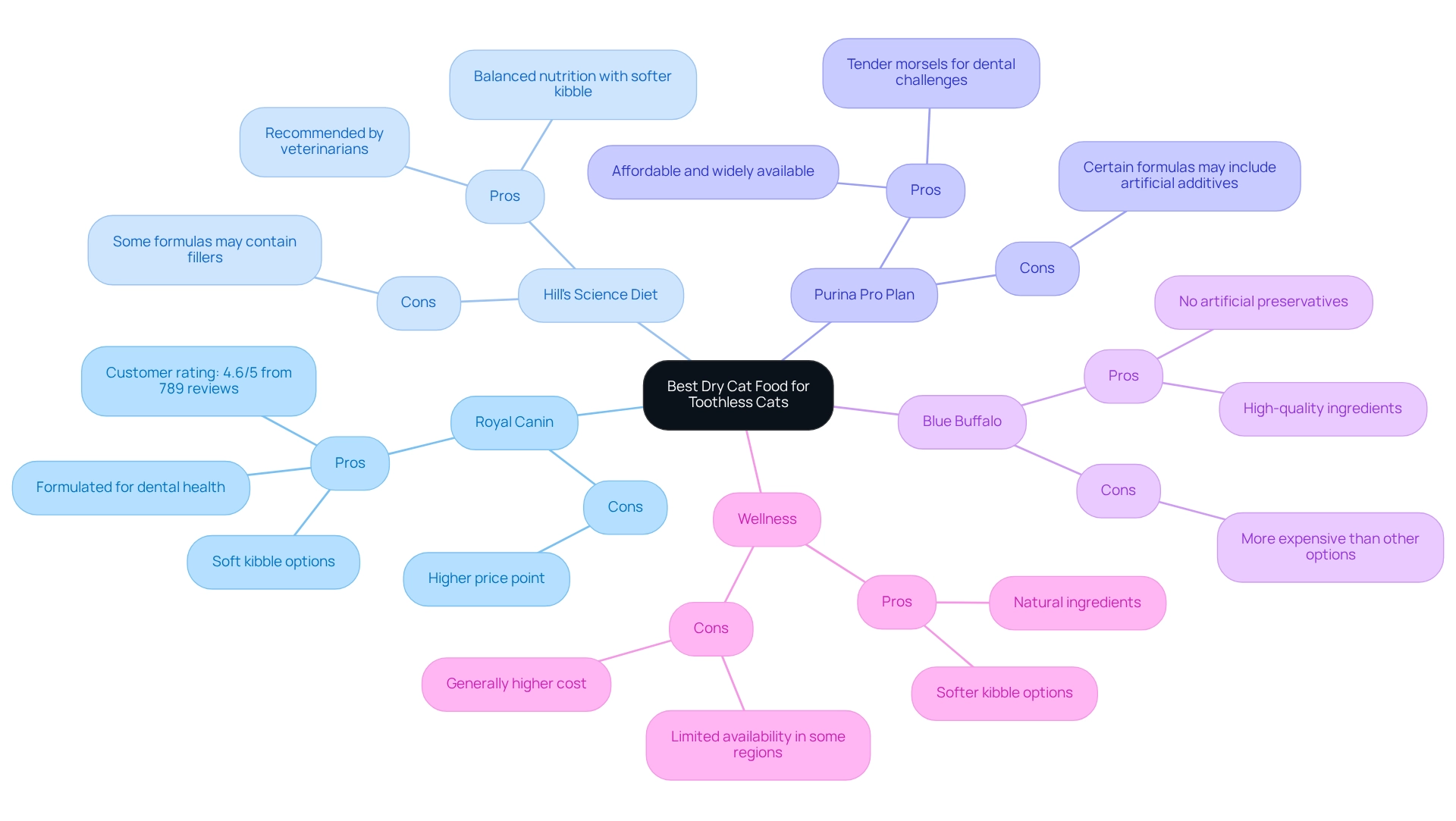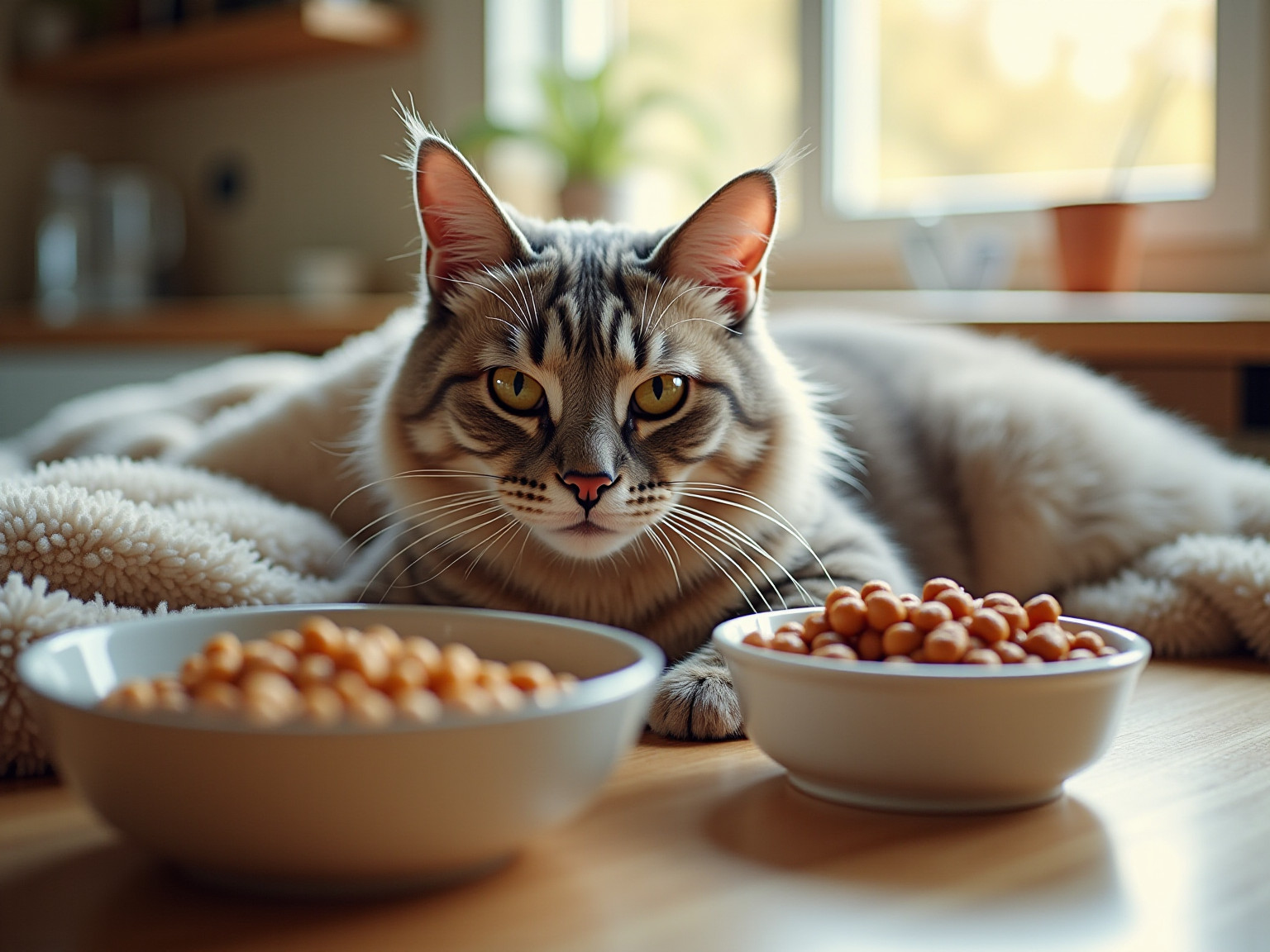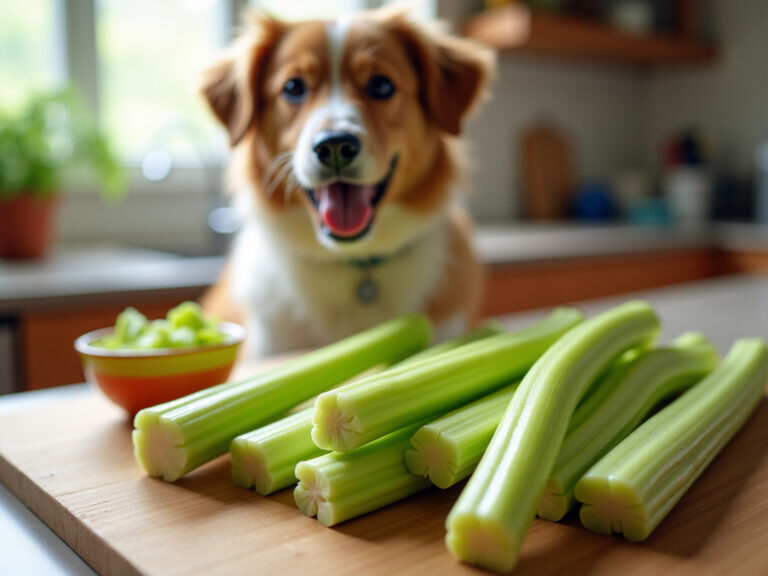Best Dry Cat Food for Toothless Cats: Brand Comparisons
Overview
When it comes to caring for your toothless feline family members, selecting the right dry cat food is essential. Brands like Royal Canin and Hill’s Science Diet stand out for their softer kibble, thoughtfully designed to make mealtime easier for cats with dental challenges. These formulations not only prioritize oral health but also ensure balanced nutrition, addressing the unique dietary needs of your beloved pets.
It’s important to know that these brands focus on providing adequate protein and hydration, so your toothless cats can thrive. By choosing the right food, you can help maintain their health and happiness, creating a nurturing environment for them to enjoy. Remember, your furry friends deserve the best care possible, and with these options, you can feel confident in your choices.
Introduction
Navigating the dietary needs of your toothless cats can feel overwhelming, but it’s a journey that many pet owners share. As these beloved furry family members age or encounter dental issues, their ability to enjoy traditional dry food often diminishes. This shift makes it essential for you to adapt your feeding strategies to ensure their well-being. A specialized diet, rich in soft, moist foods, not only guarantees that they receive the vital nutrition they need but also significantly enhances their quality of life.
Imagine providing a diet filled with high-quality protein sources and essential vitamins and minerals. Understanding the best options available can truly make all the difference for your cherished companions. In this article, we will explore important nutritional considerations, evaluate top dry cat food brands specifically designed for toothless cats, and offer a comparative analysis of their pros and cons. Together, we can empower you to make informed decisions that nurture and support your pets’ health and happiness.
Nutritional Considerations for Toothless Cats
Toothless felines, or those with restricted dentition, require a specialized diet that accommodates their unique chewing and swallowing abilities. Soft, moist foods are typically recommended, as they facilitate easier consumption and digestion. It’s essential to prioritize sufficient protein levels, given that felines are obligate carnivores needing high-quality animal protein for energy and muscle maintenance. For instance, Tiki Cat Puka Puka Luau offers 225 kcal per can, making it a suitable choice for our beloved cats without teeth. Moreover, enhancing their diet with vital vitamins and minerals is crucial for overall health.
Hydration plays a key role in the well-being of these animals. Including wet food or adding water to dry kibble can significantly reduce the risk of dehydration, a common issue for pets primarily eating dry food. Studies suggest that a balanced diet designed for toothless felines should emphasize softer textures that do not require chewing, ensuring their nutritional needs are fulfilled while considering their physical limitations. This thoughtful approach not only supports their health but also enhances their quality of life.
It’s important to understand that some individuals simply will not tolerate having their teeth brushed, and it is not worth putting yourself at risk of getting bitten. Therefore, focusing on dietary modifications becomes crucial for sustaining their oral health. Additionally, kittens typically shed their baby teeth around three months of age, while adult felines losing teeth might indicate dental problems or age-related concerns, highlighting the necessity for specific dietary considerations. Establishing a tooth brushing routine can help reduce stress for both the feline and the owner, further enhancing the overall health of our precious cats without teeth.
Top Dry Cat Food Brands for Cats with No Teeth
Many brands excel in creating the best dry cat food, specifically high-quality meals designed for cats without teeth, ensuring they receive essential nutrition without the challenge of hard kibble. Here are some notable options that can help your furry family members thrive:
- Royal Canin – Known for its veterinary diets, Royal Canin offers a variety of products formulated for oral health, featuring softer kibble that toothless felines can manage more easily. While some pet owners have raised concerns about specific batches—most notably a report of 9 kittens tragically passing after consuming Royal Canin kitten formula—the brand remains a trusted choice for many. Customer experiences frequently highlight its effectiveness in enhancing oral health among cats.
- Hill’s Science Diet – This brand is dedicated to balanced nutrition and provides dry options with smaller, softer kibble, making it suitable for felines with oral health concerns. Many satisfied clients have shared success stories that reinforce its positive impact on dental health, highlighting that brands like Purina Pro Plan, Blue Buffalo, and Wellness are among the best dry cat food options for felines facing dental challenges. While dry food can be convenient, it’s important to remember that soft, canned foods are often the best choice due to their minimal chewing requirements. This highlights the necessity of evaluating all dietary choices for your beloved pets. Furthermore, as one client, Elaine, noted, the cost of oral cleaning can be significant, with estimates around $1,500 each with sedation. This reality makes it essential for pet owners to prioritize oral health through suitable nutrition, ensuring a nurturing environment for their furry family members.
Comparative Analysis: Pros and Cons of Each Brand
When considering the best dry cat food brands for your toothless cats, it’s essential to address several key factors that ensure optimal nutrition and promote dental health for your furry family members:
- Royal Canin
Pros: Formulated specifically for dental health, Royal Canin offers soft kibble options that are easier for toothless cats to chew. With a notable customer satisfaction rating of 4.6 out of 5 stars from 789 reviews, this brand is a favorite among many pet owners.
Cons: However, the price point is higher compared to many standard brands, which may be a consideration for budget-conscious pet owners. - Hill’s Science Diet
Pros: Highly recommended by veterinarians, this brand provides balanced nutrition with softer kibble that caters to the needs of cats with dental issues. According to veterinary insights, the best dry cat food is especially effective for preserving oral health.
Cons: Some formulas may contain fillers, which could be less appealing to health-conscious pet owners seeking premium ingredients. - Purina Pro Plan
Pros: Known for its affordability and wide availability, Purina Pro Plan features tender morsels that are suitable for cats with dental challenges.
Cons: Yet, certain formulas may include artificial additives, which some pet owners prefer to avoid. - Blue Buffalo
Pros: This brand is celebrated for its high-quality ingredients and commitment to avoiding artificial preservatives, making it a healthy choice for discerning pet owners.
Cons: Keep in mind, Blue Buffalo products can be more expensive than other options on the market. - Wellness
Pros: Wellness cat food is made with natural ingredients and offers softer kibble options, ideal for toothless cats.
Cons: Availability may be limited in some regions, and the cost is generally higher than many mainstream brands.
Additionally, the case study on Ziwi Peak emphasizes the importance of tailored nutrition for pets, which is crucial for meeting the specific dietary needs of toothless cats. This thoughtful approach fosters stronger bonds between pets and their owners, highlighting the significance of selecting the right food to nurture your beloved companions.

Conclusion
To ensure the health and happiness of your toothless cats, it is essential to provide a specialized diet that meets their unique nutritional requirements. Soft, moist foods form the cornerstone of this diet, making it easier for your furry family members to consume and digest their meals. High-quality protein sources, along with essential vitamins and minerals, play a vital role in maintaining their energy levels and overall well-being. Additionally, adequate hydration is crucial, highlighting the importance of incorporating wet food or enhancing dry kibble with water.
An evaluation of top dry cat food brands reveals several excellent options specifically formulated for toothless cats. Brands like Royal Canin, Hill’s Science Diet, Purina Pro Plan, Blue Buffalo, and Wellness all offer products that cater to the needs of these pets, with softer kibble and balanced nutrition. While each brand has its pros and cons, they collectively provide valuable choices for pet owners seeking to support their cats’ dental health and nutritional needs.
Ultimately, prioritizing the dietary requirements of your toothless cats not only enhances their quality of life but also fosters a deeper bond between you and your pets. By making informed decisions about food selection, you can ensure your furry companions thrive, enjoying a fulfilling and healthy life despite the challenges they may face.
Frequently Asked Questions
What type of diet do toothless felines require?
Toothless felines require a specialized diet that includes soft, moist foods to accommodate their unique chewing and swallowing abilities.
Why is protein important for toothless cats?
Protein is essential for toothless cats because they are obligate carnivores, needing high-quality animal protein for energy and muscle maintenance.
Can you give an example of a suitable food for toothless cats?
An example of a suitable food for toothless cats is Tiki Cat Puka Puka Luau, which offers 225 kcal per can.
How can hydration be maintained for toothless felines?
Hydration can be maintained by including wet food in their diet or adding water to dry kibble, which helps reduce the risk of dehydration.
What should a balanced diet for toothless felines emphasize?
A balanced diet for toothless felines should emphasize softer textures that do not require chewing, ensuring their nutritional needs are met.
What should be considered regarding tooth brushing for toothless cats?
Some toothless cats may not tolerate having their teeth brushed, so focusing on dietary modifications is crucial for sustaining their oral health.
At what age do kittens typically shed their baby teeth?
Kittens typically shed their baby teeth around three months of age.
What does losing teeth in adult felines indicate?
Losing teeth in adult felines might indicate dental problems or age-related concerns, highlighting the need for specific dietary considerations.
How can establishing a tooth brushing routine benefit toothless cats?
Establishing a tooth brushing routine can help reduce stress for both the feline and the owner, enhancing the overall health of toothless cats.







